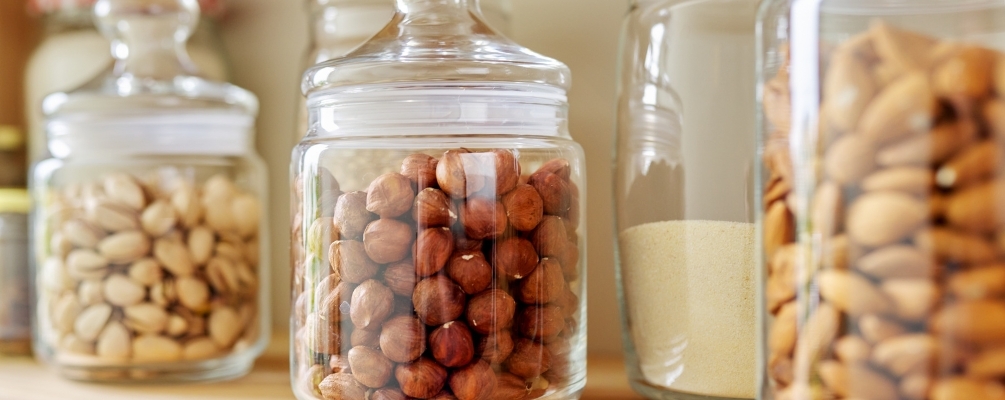High humidity, hot temperatures, exposure to excessive sunlight and infestations from insects such as pantry moths can all affect organic and natural nuts, especially those that are free from sprays and insecticides.

So, what can you do to help keep organic and natural nuts (and other organic and minimally processed products like flour and rice), in tip top shape and lessen the chance of them going rancid or attracting insects? Here’s our top tips:
Tips for Storing Organic and Natural Nuts

- Store organic and natural nuts in a cool, dry environment such as a pantry. The natural oils in organic nuts can cause them to turn rancid if exposed to excessive heat over time, leading to spoilage.
- If your home is prone to elevated temperature or high humidity, store organic nuts in your fridge or freezer in an airtight container. Not only does this help extend their freshness, but freezing nuts can kill any potential insect larvae (such as pantry moths) that may have made their way in.
- Avoid mixing your organic nuts with other foods (e.g., spicy pretzels) or different types of nuts, as they can absorb unwanted odours and flavours.
- Keep your pantry shelves clean to avoid attracting pests like moths.
- If possible, use glass jars with airtight lids to store your nuts or other airtight containers. This reduces exposure to air and pests.
WHAT DO RANCID NUTS TASTE LIKE?
Bite into a rancid nut, and you’ll know instantly! The taste is bitter and unpleasant, with a stale odour. Rancid nuts may also appear slightly soft or oily. Always ensure you store your organic nuts properly to help maintain their natural freshness.
THE BENEFITS OF CHOOSING HONEST TO GOODNESS ORGANIC AND NATURAL NUTS
Honest to Goodness Organic and Natural Nuts are free from synthetic pesticide sprays, preservatives, and GMOs. This means you're consuming nuts in their purest form, packed with nutrients, free from harmful chemicals. While some conventional nuts may contain hidden nasties due to chemical treatments, organic nuts are healthier, and a sustainable choice for your family and the planet. However, the lack of preservatives and sprays means organic nuts require proper storage to maintain their freshness. Follow our tips to enjoy their full flavour and nutritional benefits!
>>> Want to find out more about our Organic Nut Range? Explore our Organic Nut Guide here:
PANTRY MOTHS: A COMMON THREAT TO ORGANIC NUTS

Plagued by pantry moths lately? Don’t worry, you’re not alone. While they’re harmless to your health, these tiny moths can wreak havoc on pantry staples like flour, cereal, grains, dried fruit, pasta, and yes, your organic nuts! A single female pantry moth can lay up to 400 eggs in two weeks, with infestations peaking during warmer months.
Signs of pantry moths include webbing, larvae, or even live moths inside food containers, packets, or open bags. Here’s how to tackle the problem without resorting to harmful chemicals:
How to Get Rid of Pantry Moths (the Chemical-Free Way)

- Empty your pantry: Remove all items and thoroughly wipe down shelves using white vinegar.
- Inspect your food: Check all pantry items. If you notice webbing or larvae, discard the contents immediately. Seal the rubbish bag and remove it from your home to avoid further infestation.
- Wash infested containers: Use warm soapy water and dry them well before reuse.
- Freeze leftovers: Place any salvaged nuts, grains, or other pantry staples in the freezer overnight to kill any remaining eggs or larvae.
- Natural deterrents: Wipe shelves with essential oils like organic peppermint oil or organic lemon oil for a natural moth repellent. Adding dried bay leaves to your pantry can also help deter moths.
- Try our Organic Peppermint Essential Oil and Organic Lemon Essential Oil for a fresh-smelling and moth-free pantry.
- Use airtight containers: Repack your organic nuts and other pantry staples into airtight containers such as glass jars with lids. Remember to note the expiry date from the original packaging.
- Keep your pantry tidy: Regularly clean your shelves and keep cupboards closed to minimise pest access.


![Introducing Broth of Life [Supplier Spotlight] Introducing Broth of Life [Supplier Spotlight]](https://cdn11.bigcommerce.com/s-dis4vxtxtc/images/stencil/160w/uploaded_images/broth-of-life.jpg)


![Introducing Yarra Valley Tea [Supplier Spotlight] Introducing Yarra Valley Tea [Supplier Spotlight]](https://cdn11.bigcommerce.com/s-dis4vxtxtc/images/stencil/160w/uploaded_images/blog-thumbnail-yarra-valley.jpg)
![Introducing Matcha Maiden [Supplier Spotlight] Introducing Matcha Maiden [Supplier Spotlight]](https://cdn11.bigcommerce.com/s-dis4vxtxtc/images/stencil/160w/uploaded_images/blog-thumb-matcha-maiden.jpg)